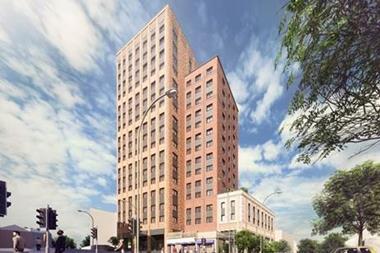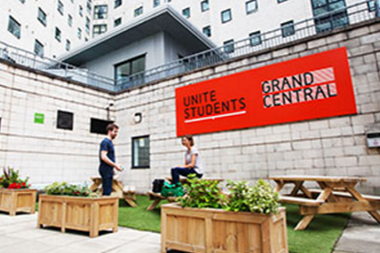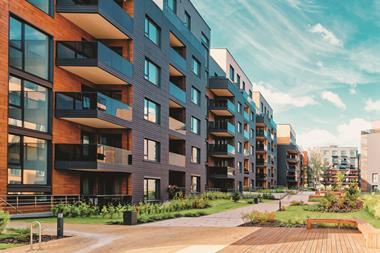The purpose-built student accommodation (PBSA) market has been more affected than most by the current pandemic. While developers and operators are quite rightly cautious about the future, there are also some very positive signs in the market.

There is debate over the shape and structure of lectures and how they will continue, and whether studying will become purely digital. The number of international students who will continue with UK courses also remains uncertain; according to Universities UK, in the 2017-18 academic year, they accounted for 19.6% of students studying at UK higher education institutions.
But despite this uncertainty, there is still a sense of positivity in the market and a demand for innovation in student accommodation remains. Research from StuRents shows the PBSA market is growing despite Covid-19. Around 25,000 new student beds are being advertised for the 2020-21 academic year, and if all the predicted development comes to fruition, the PBSA sector will hit 700,000 beds for the first time.
Despite the global pandemic, development studies are very impressive. Of course some of these schemes have been delayed or postponed, but by contrast, one of our clients is aiming to deliver three schemes in the next four months, so progress is very varied depending on who you speak to.
So how are operators and providers coping with the uncertainty in the market? For the first time, they are having to be reactive, which is something they are not used to – they are used to having a plan.
Many students have set up rent instalments designed around their current academic term and for a lot of them their future has changed – their lectures might now be digital and they might not be staying on site. So, they are having discussions with operators about this, which is an entirely new requirement to service.
Digital business imperative
On the positive side, we have seen from our clients how integral it is for businesses to be digital and this will streamline the current business processes for operators and owners. In student housing, this is particularly key to the moving process, where everything has now been moved online. Digital literacy has been common within build-to-rent (BTR), but previously for student housing it was more of a nice-to-have than a necessity. Now it is becoming an imperative.
From a ‘move-in’ perspective, you’ve got a high volume of people moving in at one time and to be able to streamline that process not only benefits the operator, but the residents too. We’ve seen a rise in the use of self-check-in services for students, which means instead of having a staff member go round with each individual student, the residents can download a mobile app to help them through it.

There are also elements of PBSA that make it easier to do online. When looking for student accommodation, quite often you aren’t looking specifically at one unit; you outline your preference and a unit is allocated to you. Units are normally built to look fairly uniform, so it’s easy to provide floor plans and video tours of units to give students an idea of what they will be renting.
As a result of the increased importance of digital, a good wifi connection is more important than ever. Students are all much more likely to be accessing their wifi in one place, either self-isolating or studying at home, so good broadband is key to a resilient and secure offering for students.
Another outcome of this pandemic has been that wellness of students has taken centre stage for the companies and operators. Previously there were always wellness offices in place, but now with students facing isolation and lockdowns, a lot of operators have assigned a wellness officer to care for students. This officer will be available for regular phone and zoom calls, and it is important for both the residents and the operators to ensure the best level of care is provided.
At Yardi, we’ve also noticed a shift towards exibility on lease terms since the pandemic hit. Students are now more reluctant to sign a long-term lease and are questioning whether they will even require the accommodation.
Tool to manage leases
So, when a unit isn’t occupied, in holidays and during the summer, the owner might want a short-term standard residential lease. At Yardi, we o er a product called RENTCafé CRM Flex, which is a tool designed to manage space and multiple residential lease formats.
This app is white labelled, so you can brand it as you want, depending on your brand or organisation. The app also allows residents to submit maintenance requests, make payments and be in control of their rental experience.
We have seen from our clients how integral it is for businesses to be digital and this will streamline the current business processes for operators and owners
What we’re also seeing is how the pandemic has highlighted the di erences between BTR and PBSA, and the importance of getting the resident experience right. With BTR, for example, you wouldn’t undertake roommate matching, which we are seeing more and more in PBSA. This allows students to choose whether they would like to live with people of a certain gender or those studying the same course as them.
However, that said, we are noticing an interesting shift in that BTR is starting to resemble PBSA more since the start of the pandemic. For instance, now that everyone is working from home, a strong wifi connection is more important to renters. It’s an interesting time to be in this sector.
A lot of operators that specialise in PBSA are branching out into BTR and bringing that knowledge with them, so the customer service is going to cross over in both sectors, and we will see increasing similarities between the two sectors.
Furthermore, what operators and owners are trying to achieve is capitalising on the customer life cycle, so once the student has nished their studies, they are familiar with the PBSA brand, which also happens to have some BTR accommodation, so they then move into a BTR development.
This makes the customer experience so important; there is an easy leasing process, familiarity with the brand and with the process – and who knows how much that will develop.
About Yardi
Yardi develops and supports industry-leading investment and property management software for all types and sizes of real estate companies.
Established in 1984, Yardi is based in Santa Barbara, California, and services clients worldwide from o ces in the UK, Europe, Australia, Asia, the Middle East and North America.
For more information, visit yardi.co.uk.






























No comments yet